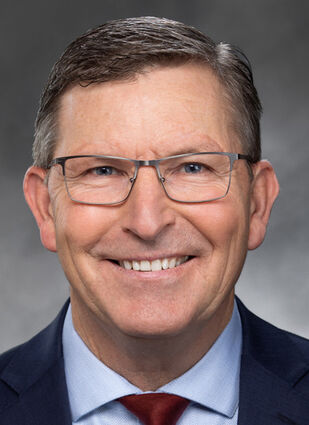Olympia Update
Voluntary Stewardship Program is the real solution for salmon recovery
February 3, 2022
By Mark Klicker, R-16, Walla Walla
OLYMPIA–It's no secret the salmon population in Washington is in crisis. We have 14 species that are either endangered or threatened with extinction in our state, with very little progress being made to restore healthy populations.
We also know we must uphold our end of the bargain to not harm our treaty tribes' fishing rights. There are also many anglers, and others in the outdoor recreation tourism industry and the general public who care deeply about healthy salmon runs. So, what can we do to create real solutions and start seeing some positive results?
I care deeply about this issue, and I truly want to help the salmon. I looked at previous models of habitat stewardship that are proven to work, like the 2011 bipartisan Voluntary Stewardship Program. I used this model to develop House Bill 1869: Encouraging Salmon Recovery Through Voluntary Stewardship, which I introduced this session.

The 2011 bipartisan Voluntary Stewardship Program law made it possible for the agriculture industry to protect critical areas for water quality, water quantity, and anadromous fish habitat. The legislation gave counties an option to participate in the program. This legislation has three key aspects:
1. Develop a stewardship plan identifying watersheds affected by agriculture production and develop a plan to protect the critical areas within that watershed.
2. Create benchmark expectations, which are set in the stewardship plan, that both farmers and ranchers must meet.
3. The state would provide funding for these projects to help the agriculture community attain these goals.
This program is showing great success, which is why we should enact this plan for counties and cities that choose to participate in a voluntary salmon recovery program.
By creating benchmarks, salmon recovery through measurable habitat improvement can finally be achieved.
House Bill 1869 would do three main things:
1. Add salmon recovery to the list of elements that a city or county may incorporate when doing their state-required comprehensive land use plans.
2. Require participating local governments to create a work plan for salmon recovery designed to result in the protection and enhancement of the functions and values of natural features that contribute to salmon habitat. Local governments would receive state technical assistance and review of their work plan. Approved work plans will have measurable performance benchmarks. Approved work plans will be eligible for state funding assistance.
3. Create a statewide salmon recovery advisory committee to assist the Department of Fish and Wildlife with review of locally created work plans.
There would be a state-funding incentive for those local governments that opt-in to the voluntary salmon recovery program, as well as state technical assistance, ensuring this would not be an unfunded mandate. There is also no liability for the local government unless the habitat improvements are funded by the state.
The state and its natural resource agencies would benefit by having the creativity and cooperation of local communities in restoring habitat on a watershed basis, according to state-approved work plans. These work plans would include benchmarks for progress that must be achieved within ten years.
Ultimately, this legislation offers a real solution to the declining salmon populations in Washington, for the state and local governments. House Bill 1869 would provide meaningful and measurable improvement in the protection and enhancement of habitat for anadromous fish.
Furthermore, it won't increase the liability of cities and counties and their taxpayers, and it encourages rather than discourages the voluntary participation of private landowners in projects that will improve habitat in a watershed. The bottom line is House Bill 1869 would help salmon recovery without hurting the farmers and landowners that are so vital to our state's food supply and economy. That's a real solution to a real problem.
Rep. Mark Klicker, R-Walla Walla represents Washington's 16th legislative district.

